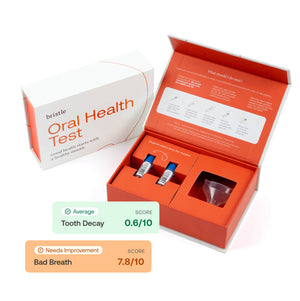This article primarily references this paper from the University of the Pacific School of Dentistry.
Our mouths are the gateway to our bodies. They serve as the first line of defense against germs or, in cases of poor oral health, an entry point for severe infections and disease. Our body is a delicate series of ecosystems working together and influencing one another. Any part that isn’t performing well can negatively affect the entire system.
Gum disease is one of the most common inflammatory diseases in adults. It presents with bleeding or swollen gums, soreness, or no symptoms at all. Recent studies suggest that the damage caused by gum disease extends beyond our mouths to the rest of our bodies, showing us that you cannot be truly healthy without good oral health.
Below we highlight this research across many diseases, including heart disease, cancer, diabetes, and more.
How does oral disease link to bodily diseases?
Our mouths are home to a community of hundreds of species of bacteria and other microbes (fungi, viruses) known as our oral microbiome. Some species are healthy, while others are harmful. In a healthy body, the helpful and harmful species coexist in a balance without any problems.
A balanced oral microbiome plays a vital role in our health. These include breaking down food, producing vitamins, and fighting off infection.
When this community gets unbalanced, though, harmful species can grow in number and cause disease. Some of these species produce acid that erodes the enamel in our teeth and causes cavities or tooth loss. Others cause damage to our gums and cause inflammation that leads to gum diseases like gingivitis or periodontitis.
The scary part about gum disease is how it can negatively affect our overall health. The mouth is the gateway to your whole body and is interconnected with most of the body’s other systems.
Inflamed gums can get cut more easily, which allows the harmful bacteria to get into our bloodstream and affect the rest of our bodies.
As these bacteria move around our body, they can cause further bodily inflammation and damage by releasing toxins and other byproducts into the bloodstream.
Oral health and heart disease
Cardiovascular disease is the leading cause of death in the U.S. and is a major cause of disability according to the CDC. Five studies followed patients over 6+ years (cohort study) and looked at the association of gum disease and heart disease. A review found that having gum disease led to a 1.14 times higher risk of developing heart disease.
Similar studies compared the rate of heart disease in patients with severe gum disease versus healthy patients. These studies observed a 2.22x higher risk of heart disease in severe gum disease patients.
Other studies have found several species of oral bacteria in the heart tissue of patients with atherosclerosis (plaque buildup in the heart’s arteries). This suggests the bacteria migrated from their mouths to their heart.
Next, researchers wanted to test if oral bacteria may be a cause of heart disease. Two studies infected mice with gum disease causing bacteria (P. gingivalis and T. denticola) and observed the effects. The mice infected with these bacteria showed signs of severe gum disease and atherosclerosis. They found the DNA of these bacteria in the mice’s mouths, hearts, and other bodily organs.
Summary: Research shows an association between severe gum disease and heart disease. Animal studies of several oral bacteria species support the association. More research will be needed to confirm a causal relationship.
Oral health and oral cancer
Cancer is among the leading causes of death worldwide, accounting for one in four deaths every year. A number of studies have looked into a possible association between gum disease and different types of cancer.
Oral cancer accounts for 3% of all cancer cases diagnosed in the US, with over 50,000 new cases each year. A review of 5 studies in 3,183 patients found that patients with gum disease had a statistically significant higher risk of oral cancer.
Other studies found a positive correlation between gum disease and pancreatic, head and neck, and lung cancers. One of these studies looked back at a sample of 1 million random insurance cases in Taiwan (retrospective study). They found patients with severe gum disease had a 1.14 times higher risk of developing cancer than those without severe gum disease.
One study looked at levels of P. gingivalis (gum disease causing bacteria) in patients with esophageal cancer (ESCC). They found the bacteria in higher levels in the cancer tissue than in healthy tissue.
Researchers from the Hebrew University in Israel observed the effects of chronic gum disease on oral cancer (OSCC) in mice. They wanted to see if these harmful bacteria could induce the creation of tumors. Their results suggest that two gum disease-causing species of bacteria can lead to tumor creation by interacting with our mouth's cells.
A separate study looked at how P. gingivalis interacts with tumor cells in cell culture (lab experiment). They showed it may actually increase the aggressiveness of the cancer cells in invasion and metastasis.
Summary: Research has shown an association between severe gum disease and oral and esophageal cancers. Animal studies of several oral bacteria species support the association. More research will be needed to confirm a causal relationship.
Oral health and colorectal cancer
Colorectal cancer (CRC) is the fourth leading cause of cancer deaths worldwide. Research has found high levels of the oral bacteria F. nucleatum in the intestinal microbiome of patients with CRC. One study analyzed 130 CRC tissue samples and found high levels of F. nucleatum and other oral bacteria species present. This suggests that these oral bacteria migrate to, and colonize, the human intestinal tract leading to inflammatory disease.
Summary: An association has been found between gum disease and colorectal cancer. Further research will be needed to directly link these bacteria to CRC.
Oral health and diabetes
Diabetes affects over 30 million people in the United States, with more than 1 in 4 of them unaware they have the disease. Research has suggested a “two-way” association between diabetes and gum disease. Chronic inflammation from gum disease may weaken a body’s immune response. This may further prevent the body’s ability to tolerate blood sugar leading to increased insulin requirements.
Individuals with chronic infections show severe and sustained insulin resistance (type 2 diabetes). A study of 124 middle-aged men infected with enteroviruses and C. pneumoniae suggested that infection by multiple harmful bacteria could cause chronic low-grade inflammation, resulting in insulin resistance.
A research group from the University of Amsterdam explored the effect of gum disease treatment on the blood sugar control of patients with type 2 diabetes. They reviewed the available literature and suggested that gum disease treatment led to an improvement in the ability to regulate blood sugar in patients with type 2 diabetes for at least 3 months.
There also appears to be a relationship between patients with diabetes having a higher risk for developing gum disease. Poor blood sugar control can hinder the body’s immune response, which can lead to poor wound healing and gum disease. Patients with diabetes have a threefold increase in the risk of developing gum disease.
Summary: Gum disease may increase the risk of diabetes by causing chronic inflammation which harms the body’s immune response and adversely impacts blood sugar control. Patients with diabetes also face a higher risk of developing gum disease.
Oral health and Alzheimer's disease
Alzheimer's disease (AD) is a neurodegenerative disease with symptoms of progressive and irreversible impairment in memory, thinking, and language capacity, ultimately ending in death. The root cause of Alzheimer's is an area of intensive research, but an association with oral health and gum disease has emerged in recent findings.
The brain has a different immune response from the rest of our bodies known as its "immunologic privilege", and can undergo different inflammatory processes that contribute to the development of AD. The brain also has a defense known as the “blood-brain barrier” that forces blood vessels through a tight gap before reaching the brain, which is designed to prevent harmful products or microbes from entering the brain.
One hypothesis of AD development, known as the "microbial hypothesis", proposes that AD may be caused by an infection by certain bacteria (or other microbes) that manage to pass through the blood-brain barrier, leading to an inflammation process that leads to AD.
A hallmark symptom of AD is the presence of activated immune cells in the brain (known as glial cells) that produce high levels of inflammation response. Normally these brain cells are responsible for removing protein and other waste buildup in the brain around neurons (allowing them to keep sending signals).
Chronic inflammation may lead to the brain's immune cells no longer being able to clear the build-up of plaques and other molecules that buildup around neurons, leading to further brain damage.
One study analyzed the bacteria found in the brains of victims of AD, and found P. gingivalis (gum disease species) in over 90% of AD patients. Further research found other oral bacteria species, (T. forsythia, F. nucelatum) which suggests that these gum disease associated species may be able to cross the blood-brain barrier and cause infection.
Summary: An association has been found between gum disease and Alzheimer’s disease. Further research will be needed to directly link these bacteria to AD.
Oral health and adverse pregnancy outcomes
Maternal microbial infections during pregnancy have been associated with a number of adverse outcomes, including preterm labor, pre-eclampsia, low birthweight, miscarriage, and more. Due to hormonal changes during pregnancy, pregnant women are more likely to have gum disease than non-pregnant women, with ~40% of pregnant women having evidence of disease.
There are two proposed ideas for how oral health is related to adverse pregnancy outcomes. The first is that oral bacteria can move from an unhealthy mouth into the placenta, reaching the amniotic fluid and fetal circulatory system.
The second suggests that the toxins released by oral bacteria, or the molecules released during an inflammation response to oral bacteria, could affect the development of the fetus.
It has been found that both bacteria and the byproducts of their infection in gum disease can cross the placental barrier (barrier between mother and fetus) and cause disturbances which may contribute to adverse pregnancy outcomes.
The most common oral bacteria found in placental and fetal tissues is F. nucleatum. F. nucleatum has been found in amniotic fluid and cord blood in cases of preterm birth and neonatal sepsis.
Other oral bacterial products, like P. gingivalis and its toxins, were found in the placenta of preterm delivery patients. Animal studies in mice and rats have shown similar findings. One study found that toxins produced by P. gingivalis led to fetal growth restriction and loss. Another study administered P. gingivalis antibodies in pregnant mice, which led to fetal loss.
Summary: An association has been found between gum disease and adverse pregnancy outcomes. More research will be needed to confirm a cause-and-effect relationship between gum disease and adverse pregnancy outcomes.
Oral health and male sexual wellness
Recent studies have found a possible relationship of gum disease and male reproductive health issues in men due to chronic inflammation. A 2009 study explored the link between gum disease and erectile dysfunction in men aged 30-40 years old, and found that men with advanced gum were 3x more likely to suffer from erectile dysfunction than men without gum disease.
Researchers have also explored a possible connection between male infertility and oral health status. Studies have found that oral disease can lead to bacteria being present in sperm (bacteriospermia), and that byproducts of an inflammatory response against oral bacteria could lead to sperm death (apoptosis) and lower sperm count.
Summary: An association has been found between gum disease and male reproductive health issues (erectile dysfunction and low sperm count). More research will be needed to confirm a cause-and-effect relationship between gum disease and male reproductive conditions.
References:






